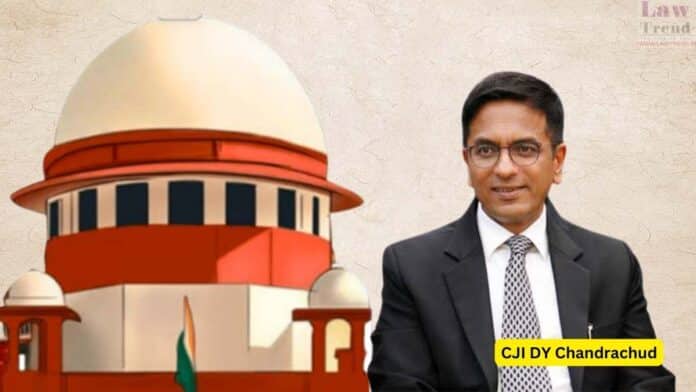Chief Justice of India (CJI) D Y Chandrachud’s first 100 days in office saw the Supreme Court take a giant leap towards reforms, especially making courts more technology-friendly, and ensuring relatively fast judicial appointments including those of eight judges to the apex court.
During the tenure of Justice Chandrachud, the 50th head of the judiciary, the top court witnessed a sharp rise in disposal of cases with the number of cases getting disposed exceeding those filed.
Justice Chandrachud, son of former CJI Y V Chandrachud, was sworn in as the CJI on November 9 last year and is due to retire on November 10, 2024.

As per information shared by an apex court source, during the first 100 days of Justice Chandrachud’s stint as the CJI, several steps have been taken including those for digitization of records, online appearance slips for lawyers, RTI online portal and launch of digital courts desktop application.
“During the period ranging from November 9, 2022 to February 15, 2023, total number of cases filed are 13,764 and total number of cases disposed of are 14,209,” the source said.
On the issue of judicial appointments, eight judges have been appointed in the apex court during Justice Chandrachud’s tenure while 12 names have been recommended by the apex court Collegium for appointment of high court chief justices.
“Against these recommendations, four chief justices (including one woman and one belonging to OBC) have been appointed. In an unprecedented manner, recommendations have been made against anticipated vacancies of chief justices of two high courts,” the source said.
“Thirtyfive names (including seven names of women candidates) have been recommended by the SC Collegium for appointment of high court judges. 30 judges (including seven women judges, eight belonging to OBC, two SC, one ST, one Christian and one Muslim) in high courts have since been appointed,” he said.
He said while recommending the names for judicial appointments, the aspects of inclusion of gender diversity and the need to give due representation to marginalsed and backward sections of the society and minorities are being duly taken into consideration by the Collegium.
For the first time, CJI Chandrachud-led Collegium started the practice of providing details of deliberations in recommending the names to the Centre for judgeship.
The source said, in a conference held on the occasion of the Constitution Day in November last year, Justice Chandrachud had urged the chief justices of the high courts to accord priority to filling up vacant posts at all levels by making merit-based recommendations of suitable persons with impeccable integrity and personal and professional conduct.
He said on January 2 this year, the CJI had launched the e-SCR (Supreme Court Reports) with more than 34,000 judgments available online.
“With an aim to provide access to the judgments in scheduled languages, the new feature provides translated versions of Supreme Court judgments in Indian languages,” he said, adding so far 3,132 judgments translated in Indian languages are available.
The source said since the launch of advocate appearance slip portal, 1,42,818 online appearance slips have been submitted and equal number of paper sheets, if not more, have been saved.
“The process of scanning and providing soft paper books for paperless court functioning are inspired by the visionary outlook of the Chief Justice of India to ensure that judiciary uses technology to its optimum level. The PIL section has also started extensive use of technology and is working towards electronic processing of petitions,” he said.
He said with the decision of the competent authority to continue hearing in physical-hybrid mode, the computer cell has played a key role to ensure that video conference infrastructure and services are up and running 24×7.
“Since November 9, 2022 until February 15, 2023, the Supreme Court of India has witnessed 2,53,919 attendees for VC hearings. Further, during the same period, 43 hearings of constitution bench cases through YouTube and NIC webcast services have been live-streamed,” the source said.
The information shared by the source said the ‘Supreme Court Committee on Accessibility’ has been constituted with a broad aim to conduct an accessibility audit of the top court premises and its functioning.
It said training sessions in stress management, communication and presentation skills, organisational behaviour and ethics and value in public governance, critical thinking, problem solving and decision making for the officers and staff members of the registry are underway.
It said the ‘AI assisted Legal Translation Advisory Committee’ has been constituted to assess and monitor the progress of and to suggest measures to further enhance usage of Artificial Intelligence tools for translating judicial records in various vernacular languages in the top court.
“The RTI online portal launched on November 24, 2022 has been a giant leap towards transparency, paperless filing of applications, appeals and payment of fees through online mode such as net banking, card payments, UPI, etc. Around 450 online RTI applications have been received till date,” the source said.
He said PIL-English branch has started online processing of all petitions received electronically by e-mail and through this initiative, the SC Registry will be saving enormously in terms of papers and manpower.
“Based on the statistics of last year, 83,000 letter petitions were received electronically, and presuming that on an average each petition consists of at least two pages, the Registry will be saving 1,66,000 pages equivalent to 332 reams of A-4 size paper,” the data said.
It said on the judicial side, several initiatives have been taken and fresh and after notice matters are being listed on Monday, Tuesday and Friday and only regular matters are listed on Wednesday and Thursday.
The source also shared details about initiatives of e-committee, which includes “sensitization module for the judiciary on LGBTIQA+ community”.
He said based on a proposal of the e-Committee, the Finance Minister has announced Rs 7,000 crore budget outlay for phase 3 of the e-Courts project.







